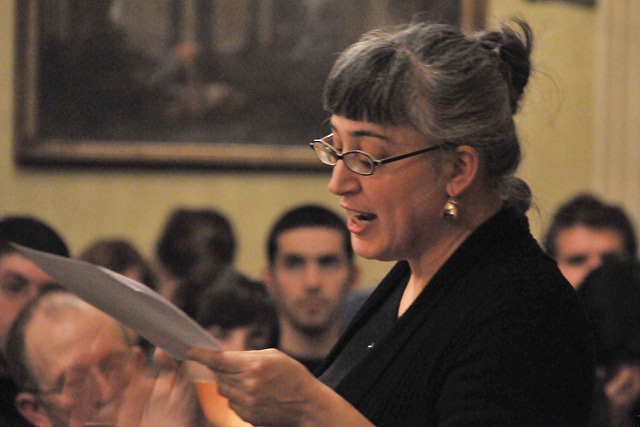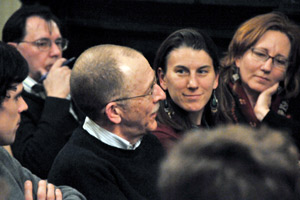‘War’ Topic of Ongoing Humanities’ Lecture Series

In the 1970s, veterans, activists and psychiatrists were hard at work getting the disorder that came to be called post-traumatic stress disorder (PTSD) included in the upcoming edition of the Diagnostic and Statistical Manual of Mental Disorders III. During the same period, feminists were building a successful anti-rape movement that crucially insisted that rape is a form of violence.
On Feb. 15, Sally Bachner, assistant professor of English, spoke on “Rape Trauma, Combat Trauma, and the Making of PTSD: Feminist Fiction in the 1970s” during the Center for the John E. Sawyer Spring Lecture Series on War.

Bachner proposed that while both of these groups sought to bring suffering – of combat veterans and rape victims, respectively – into speech, many feminist novelists of this period instead turn to the figure of the soldier to figure rape as unspeakable. PTSD functions in these texts as a technology for figuring what was initially conceived of as suppressed speech about violence against women as a putatively “unspeakable” trauma.
Bachner, who is currently completing a book on violence in contemporary American fiction titled, The Prestige of Violence: American Fiction, 1962-2002, is among a dozen guests speaking in CHUM’s ongoing lecture series. Past topics this spring include robots and war, the war between international law and politics, U.S. foreign policy with Iraq and Afghanistan and war and the nation. Most recently, Trevor Paglen, artist and geographer; researcher in the Department of Geography, University of California, Berkeley, spoke on “Blank Spots on the Map: State Secrecy and the Limits of the Visible.”
Other upcoming CHUM Spring Semester lectures include:
On March 22, Jeff Rider, professor of romance languages and literatures, will speak on the “War in Flanders in 1127-28.”
On April 5, Dominick Lacapra, professor of history and comparative literature at Cornell University, will speak on “Fascism and the Sacred: Sites of Inquiry After (or Along with) Trauma.
On April 12, Judith Herman, professor of psychiatry at Harvard Medical School , will speak on “Justice from the Victim’s Perspective.”
On April 19, Don Moon, professor of government, dean of the Social Sciences and Interdisciplinary Programs, will speak on “Paradoxes of International Justice.”
On April 26, Isaiah Wilson III, Lieutenant Colonel, U.S. Army, director of American Politics, Policy and Strategy, associate professor of social sciences at West Point Academy, will speak on “Thinking Beyond War.”
On May 3, Claire Potter, professor of history and American studies, will speak on “Re-thinking Feminism’s Sex Wars: Theorizing Male Violence in the Age of Reagan.”
The John E. Sawyer Series is supported by the Mellon Foundation. All lectures begin at 8 p.m. and are held in Russell House. For more information e-mail sferris@wesleyan.edu or call 860-685-3044. The complete lecture series schedule is online here.

